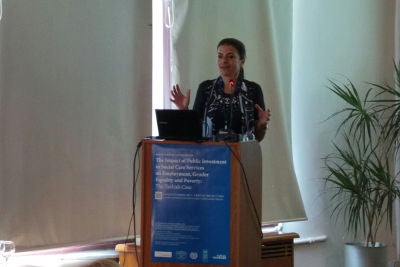Investing in young children pays off for the economy
By İpek İlkkaracan, Kijong Kim and Tolga Kaya
Date:

İpek İlkkaracan, Kijong Kim and Tolga Kaya are authors of the study The Impact of Public Investment in Social Care Services on Employment, Gender Equality and Poverty: The Turkish Case prepared by Istanbul Technical University Women’s Studies Centre and the Levy Economics Institute of Bard College, in partnership with ILO, UNDP and UN Women.
A high quality Early Childhood Care and Preschool Education (ECCPE) is a profitable investment, shaping the minds of children to become productive citizens of the future. However, the enrollment rate in preschools and other educational childcare programs in Turkey remains far behind the OECD average. To catch up with the OECD average, more than 3 million children will need to enroll in the programs, hire approximately 600,000 teachers and staff, and secure material and services to run the facilities. How big of an investment is it going to be? To answer the question, we, Istanbul Technical University Women’s Studies Center and the Levy Economics Institute in New York, conducted a survey of over 100 childcare centers and preschools in Istanbul, and reached a number: 20.7 billion Turkish Lira a year in 2014. It is a serious financial commitment, equivalent to over 1.3 percent of GDP in 2014.
Given the size of investment, it is only natural to gauge the economy-wide impact, and we did just that and here is what we found: The ECCPE investment would create almost 720,000 jobs and over 100,000 jobs would be in other sectors. As a benchmark, we conducted a comparative exercise with the same amount of investment, this time, in construction, one of the booming sectors in Turkey. Despite all the visual spectacles of tall structures and heavy machineries, its potential for job creation was subpar. Total 290,000 jobs would be created and about 90,000 of them would be in other sectors.
Not only does the ECCPE sector investment create more jobs, but it creates more decent jobs than in construction: 85 versus 30 percent in terms of jobs with social security benefits; and 84 versus 25 percent in terms of jobs with a contract of unlimited duration. The higher share of formal employment also yields higher income tax revenue and social security contributions that amount to 77 percent of the cost, while the same investment in construction covers only 52 percent.
Despite the male dominance in the labour market, women benefit the most from the investment. They take up 73 percent of the new jobs from the ECCPE investment, while only 6 percent goes to women in the case of construction. The investment creates employment opportunities to almost 400,000 homemakers, many of whom had to quit their jobs after marriage. Their re-entry into the workforce will empower them with gainful employment and contribute to household income to get their family out of poverty.
Allocating public resources towards an expansion of ECCPE service sector seems to constitute an effective and equitable strategy for job creation in Turkey. Why not making the smart investment for ourselves as well as our children? It takes a village to raise a child, and in doing so, the whole village reaps the benefit!